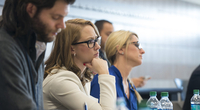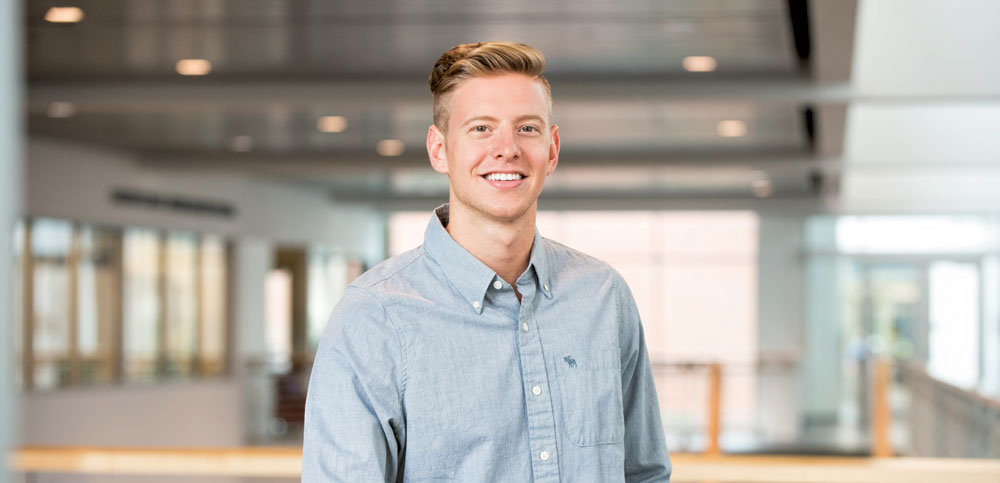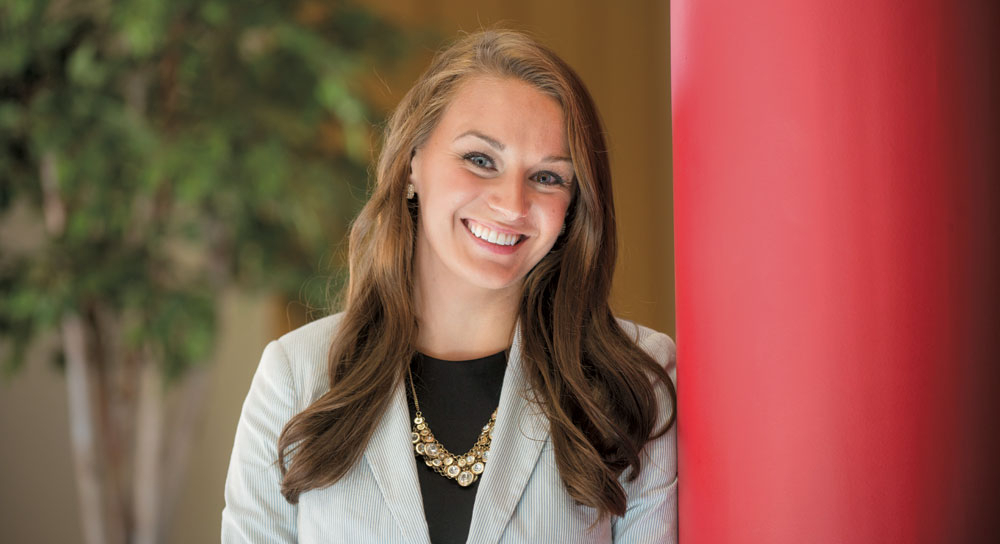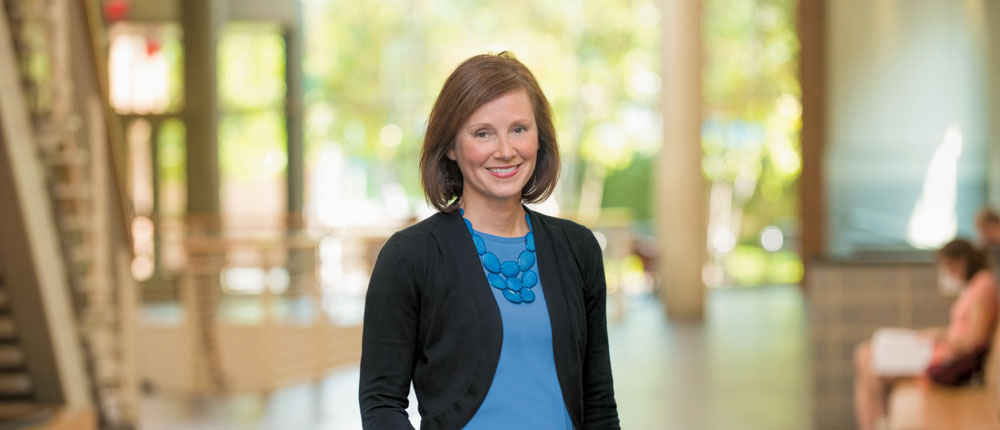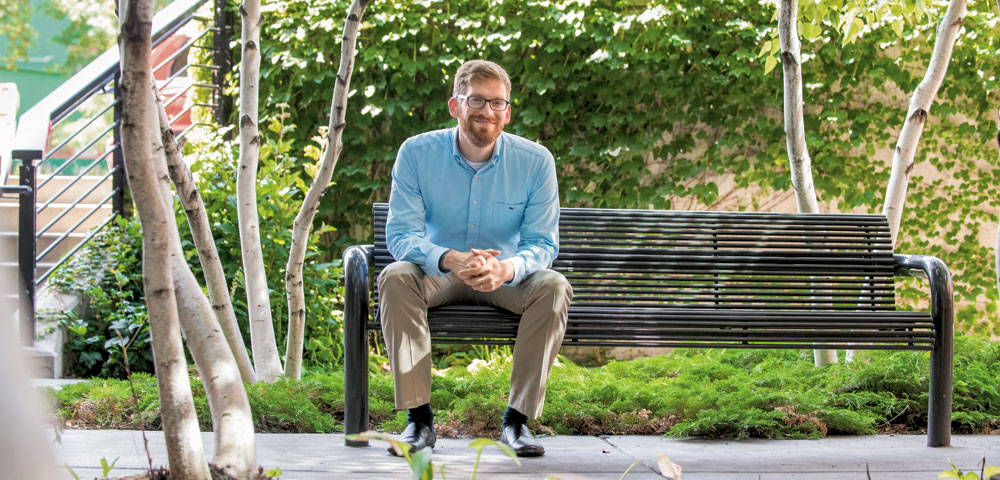
Tangible Results
Wednesday, November 25, 2015
Corporate support helps bring many Carlson School programs to life. Without involvement from the business sector, many would be difficult or even impossible to run effectively.
Consider the Medical Industry Leadership Institute (MILI), nationally recognized as a leader in research and education.
"Without the support of corporations, MILI would not have evolved beyond start-up stage five years ago," says MILI Director and Professor Stephen Parente. "Firms’ intellectual and financial support combined with their willingness to create a community discussion on the future of the medical industry has distinguished MILI from other graduate healthcare MBA programs in the world."
MILI counts among its supporters UnitedHealth Group—which has funded scholarships, seminars, and salaries with a five-year, $1 million gift—as well as Blue Cross Blue Shield of Minnesota, Boston Scientific, HealthPartners, Medtronic, and Pfizer. These five currently support MILI with a $30,000-per-year gift. Allina and Fairview Health Services have also done so in the past.
And these relationships go beyond money to company engagement through site visits, informational interviews, and event speakers.
"Many support us financially, but all support us with advice and guidance," says MILI Associate Director Jessica Haupt.
Some companies, like Travelers, run the gamut in their engagement with the Carlson School. Memorable for decking out the Atrium in its iconic red umbrellas during career information days, Travelers is a founding sponsor of the popular GopherBusiness program (pictured above) and a sponsor of an annual MIS case competition, among numerous other connections. The school is a partner with Travelers EDGE (Empowering Dreams for Graduation and Employment), a program to increase education access to underrepresented students.
In March, the Carlson School hosted Tech Cities, the first of a planned annual event to bring together professionals, thought leaders, and educators to chart the future of Minnesota tech. What started with a guest speaker and a couple of workshops has grown into a major event featuring 39 speakers and presenters—in large part due to corporate engagement.
"Forty percent of MBAs are interested in tech, so we needed to start to make relationships with these companies," says Graduate Business Career Center Director Maggie Tomas. She and Institutional Advancement Development Officer Bradley Starbuck then went out to secure these relationships and found an eager audience.
"A lot of new companies that are tech-focused don’t think of Carlson," Starbuck says. "This opened up a lot of doors and conversations we haven’t had. Company sponsorship underwrote Tech Cities and connected 350 people around that conversation."
These examples are ways in which corporations have offered support at a school-wide level, but individual support is just as common, and oftentimes even more valuable. Here is a look at five individuals who can attribute some of their success to corporate philanthropy.
Aspiring marketing leader wins scholarship
The first time senior Brandon Creamer visited the Carlson School, he says he was surprised at how beautiful the school was; the incredible resources available to business students; and the various opportunities to get involved, become a leader, and make an impact in the business community.
The Waunakee, Wisconsin, native felt honored, then, when he was accepted to the school as a freshman. Today, his dream is to be a senior vice president of marketing or finance for a large corporation with a powerful brand and serve on a board of directors for a company in which he has a passion.
Creamer is the first to admit that his journey would not be at all possible without the financial help he has received through various scholarships. Among the scholarships was one from Spectrum Brands Inc., a company he interned with the summer after high school. The company challenged its more than 50 interns to identify an area of financial improvement that could be implemented companywide. Proposals were drawn up and presented to company directors and senior-level managers, all the way up to the CFO and division vice presidents. Creamer and his partner won the competition and spilt a $1,000 scholarship prize.
At the Carlson School, Creamer was on a team that won a $5,000 scholarship from Target. For the last several years, Target has sponsored a case study competition in the business communication class. This year’s objective was to develop a detailed proposal for Target’s next online or mobile acquisition in order to position the company as a top omnichannel retailer, particularly within the style, kids, baby, or wellness segments.
"Our team decided to focus on the style segment and created a proposal to acquire the online specialty men’s retailer, Jack Threads," Creamer says. "In addition to carefully analyzing Target’s brand commitment and company profile, we completed a full analysis of Jack Thread’s target customer base, merchandise portfolio, and financial composition in order to ensure strategic alignment for the acquisition."
The best proposals from each class section were sent to Target for judging, and Creamer’s team was chosen as one of four finalists to present in front of the company’s core strategy team. In the final presentation, his team placed runner-up out of 72 others.
These two examples, among others, have given Creamer a first-hand experience with corporate philanthropy. “It is important for alumni, companies, and friends to give back, because without those resources and funds that they provide, students would no longer have access to amazing networking opportunities, mentorship programs, or career-related events,” he says. “The level of highly educated professors would diminish, and the Carlson School’s renowned image would slowly begin to fade away. Students would not be pushed to their full potential, and many of the future business leaders of tomorrow would never exist.”
Enterprise Program offers real-world consulting experience
During her time as an MBA student, Sara Moret has received several scholarships and fellowships to support her educational journey financially. She also received support from the corporate world, albeit more indirectly—through the Carlson Consulting Enterprise (CCE).
The Carlson School Enterprise programs—Consulting, Brand, Ventures, and Funds—owe their existence in part to the support of client businesses. CCE alone has served more than 100 clients since 2002. In the program, students work closely with the clients to find solutions to real-world business problems. In the end, everyone comes out ahead: The students are gaining valuable experience, businesses are receiving top-quality work at a lower cost, and the school strengthens its relationships with partner companies.
“My case in CCE was a fantastic opportunity to do real strategy work with a Fortune 500 company," Moret says. "Without previous experience in consulting, CCE was a safe place for me to learn and make mistakes with the help of our fearless leader, Sarah Gisser. Knowing we are students, Sarah takes our consultant roles very seriously and expects the best out of each and every one of us."
At the same time Moret was in the CCE, she was offered an internship at Bain & Company, one of the most elite consulting firms in the world.
"CCE was a very close representation of the ‘real job.’ It also prepared me more than I would have expected for my internship," she says. "I began my summer internship knowing tricks and tools of the job that my peers from other schools had never heard of. CCE prepared me to work alongside some of the most talented individuals in the world from nearly every other elite business school in the country."
Moret says she hopes to continue her path into management consulting after graduation. For getting onto this path, she praises both the CCE as well as engaged alumni.
"The alumni network has been so much more valuable than I ever could have imagined," she says. "I absolutely would not have been considered for my internship without the Carlson name behind me."
Moret ended up at Bain, which didn’t have a recruiting effort on campus, by an undergraduate alumni who offered to help get her résumé to the right people.
"The passion that alumni have for the school is so fantastic, and I think my story is a great example of that," Moret says. "I have been able to make a career move I could never have dreamed possible before starting full-time, and it was because of the generosity and support of alumni and friends of the school."
Companies support research and teaching
In May of this year, Work and Organizations Professor Theresa Glomb was appointed to the Toro Company-David M. Lilly Chair in Human Resources. The endowed chair, established through a grant of $2 million from The Toro Company and the Melrose/Toro Community Fund, is to honor the legacy of David M. Lilly, the company’s fourth president and former dean of the Carlson School. The grant will go to assist the University in recruiting and retaining outstanding faculty at the Carlson School and to support advancements in teaching, research, and service.
After she was named to the chair, Glomb read up on Lilly. "I found a decades-old interview and something he said really resonated with me," she says. "He said, ‘Imagine the Twin Cities without the University.’ Indeed, the University plays a huge role in the cities. But let me add that we should also ‘Imagine the University without the Twin Cities.’ These gifts are a reminder of the deep and steady partnership between the University and the community that is truly exceptional."
Glomb’s research interests are in employee health and well-being, emotion in organizations, and job attitudes and behaviors. As for her own workplace position, Glomb has a very positive attitude.
"At the center of my job are the great people I have the good fortune to work with," she says. "Many people have this image of the professor alone, slogging away in his or her office, and there are certainly days like that. But more often my work involves interacting with others on a research project, committee, or in the classroom. My colleagues, doctoral students, and students in class are incredibly bright and motivated people, so that’s very energizing."
Glomb adds that she also is fortunate that the job of a professor is multifaceted, with research, teaching, and service components that change from year to year. "You can recreate yourself every once in a while by tackling new research questions, taking on a new role at the school, or teaching new classes," she says.
Glomb says she hopes she has just as much of an impact on her students, discipline, and community through her research, teaching, and service as benefactor support has impacted her.
"Benefactors may not realize how important gifts such as these are to the recipients and to the Carlson School, but they are truly meaningful," she says. "I also feel these gifts go far beyond the impact on the individual. Rather, by supporting the faculty, school, and University, the Twin Cities and the state of Minnesota are improved."
Faculty grants nurture emerging researchers
Information and Decision Sciences Assistant Professor Gordon Burtch enjoys studying crowdfunding, crowdsourcing, social media, and word of mouth. He is fascinated as to what drives individual behavior, and his research seeks to identify and quantify these drivers.
"The idea that I am paid to research whatever interests me—within the bounds of my field, of course—is very appealing," he says. "You don’t get this type of freedom in most other professions. This position also affords me the opportunity to make a significant impact on the business community—I recently provided feedback on the equity crowdfunding legislation for Minnesota."
Burtch’s research informs other aspects of his faculty position as well. "I frequently incorporate my latest research into my teaching activities," he says. "In the IT core class in the Full-Time MBA program, I teach a module that pertains directly to my research area of crowdfunding and crowdsourcing."
Support for Burtch’s research at the moment comes from a 3M Non-tenure Faculty Grant. The grant, which is awarded by 3M Research in Development in partnership with the company’s Corporate Giving Program, is given to young faculty members to fund their research. They are then invited to come and showcase their efforts to peers and technical employees at a 3M Science and Engineering Faculty Day. Throughout the years, 3M has shown itself to be a major supporter of the University of Minnesota, having funded more than $40 million in scholarships, fellowships, and other programs.
"Benefactors play a major role in professors’ research, because their support enables us to place a greater focus on research and teaching, rather than grant writing," Burtch says. "This results in higher quality research and an improved education for the next generation of business leaders."
Investing in the future
A few years ago, senior Shayla Thacker attended GopherBusiness, a week-long business camp at the Carlson School aimed at high-achieving, economically disadvantaged high school students. "It gave me a feel for what studying at Carlson and a career in business would be like," she says. She was accepted to every Minnesota college she applied to after graduating high school, but chose the Carlson School because it "had the best resources and culture for business in Minnesota, hands-down."
Thacker plans to start out in the corporate world after graduation, getting some experience under her belt and a better understanding of how business works. Eventually, she would like to be on the starting end.
"I’d use the skills I have gained in school and what I will gain through work, as well as knowledge attained from my peers, mentors, and associates to be a key player in helping those with great ideas materialize their vision for a company or starting my own and growing it to a point where it can be handed off to a person or people who can stay with it, grow it, and allow it to thrive," she says. "That is my ultimate vision."
She can list several ways the Carlson School is bringing her closer to her vision:
- Education abroad: "It has opened my eyes to what’s out there, as well as the capacity that I have to fulfill and accomplish anything I set my mind to."
- Academic content: "The academic rigor that the courses offered by the Carlson School really pushes students to be great, not only in the work they do, but in the thought process itself. The professors have a high level of expectation, and the bar for excellence is raised."
- Career assistance: "The Carlson School has developed a world-class platform for the career development of its students. Access to these resources pushes and highly encourages students to seek internships, which is invaluable."
- Scholarships: "As students, we benefit from these gifts and are allowed to have a more enriching experience."
During her time as a student, Thacker has been fortunate to be the recipient of many varied scholarships. Among others, she has been awarded the Dell Scholarship, which provided her with a laptop, printer, textbook credits, and tuition money, as well as other forms of support, and the Wallin Scholarship, which pays for part of her tuition and provides her with an advisor who works closely with her to ensure academic success.
"Wallin has various donors who sponsor specific scholars. My donor is General Mills," she says. "Because I am a General Mills scholar, I also get invited to Wallin-General Mills functions and mentor programs."
Whether these gifts are monetary or no, Thacker says they both hold a similar weight of importance. "By giving back, we are investing in our future," she says. "It allows students the opportunity to develop and grow as business leaders that much more through the time, energy, and gifts given. It also creates a direct line of recruits and access to these students as new hires."
Without this generous support, Thacker says she would not have the opportunity to be where she is today. "I come from a household whose income is below the U.S. poverty line, and would have had no family monetary support," she says. "As a bright young person with lots of potential, I have been provided with the opportunity to rise to that potential."
To her benefactors, she says she admires their acknowledgment and understanding that the future needs to be invested in. "I assure you your investment is not being wasted, and that I, upon crossing the line into success, will also invest my time, energy, and resources in the next generation."
